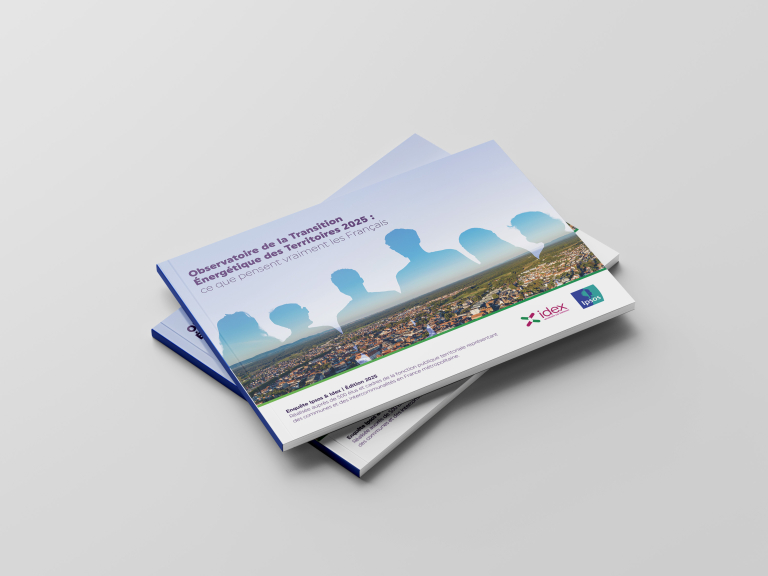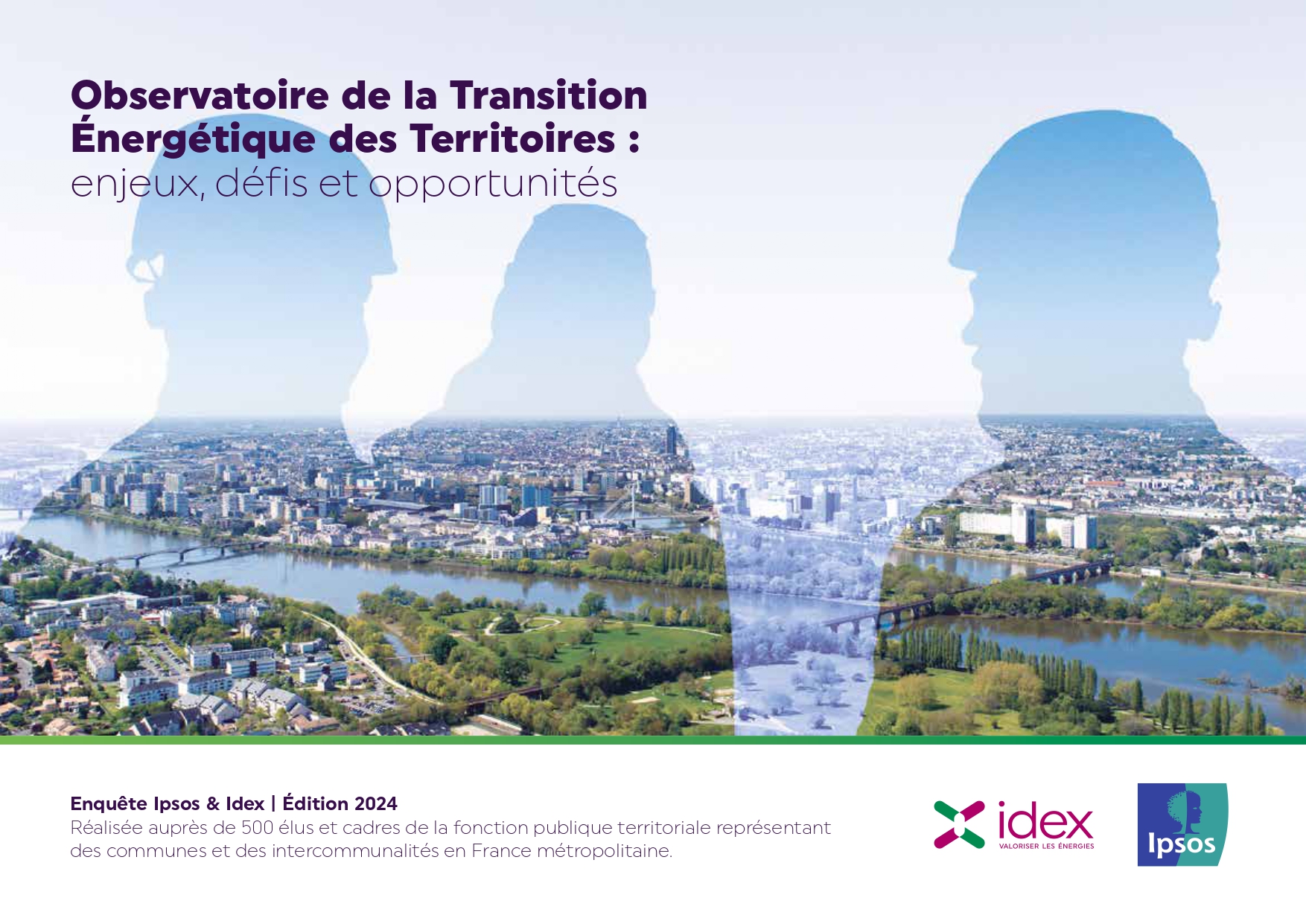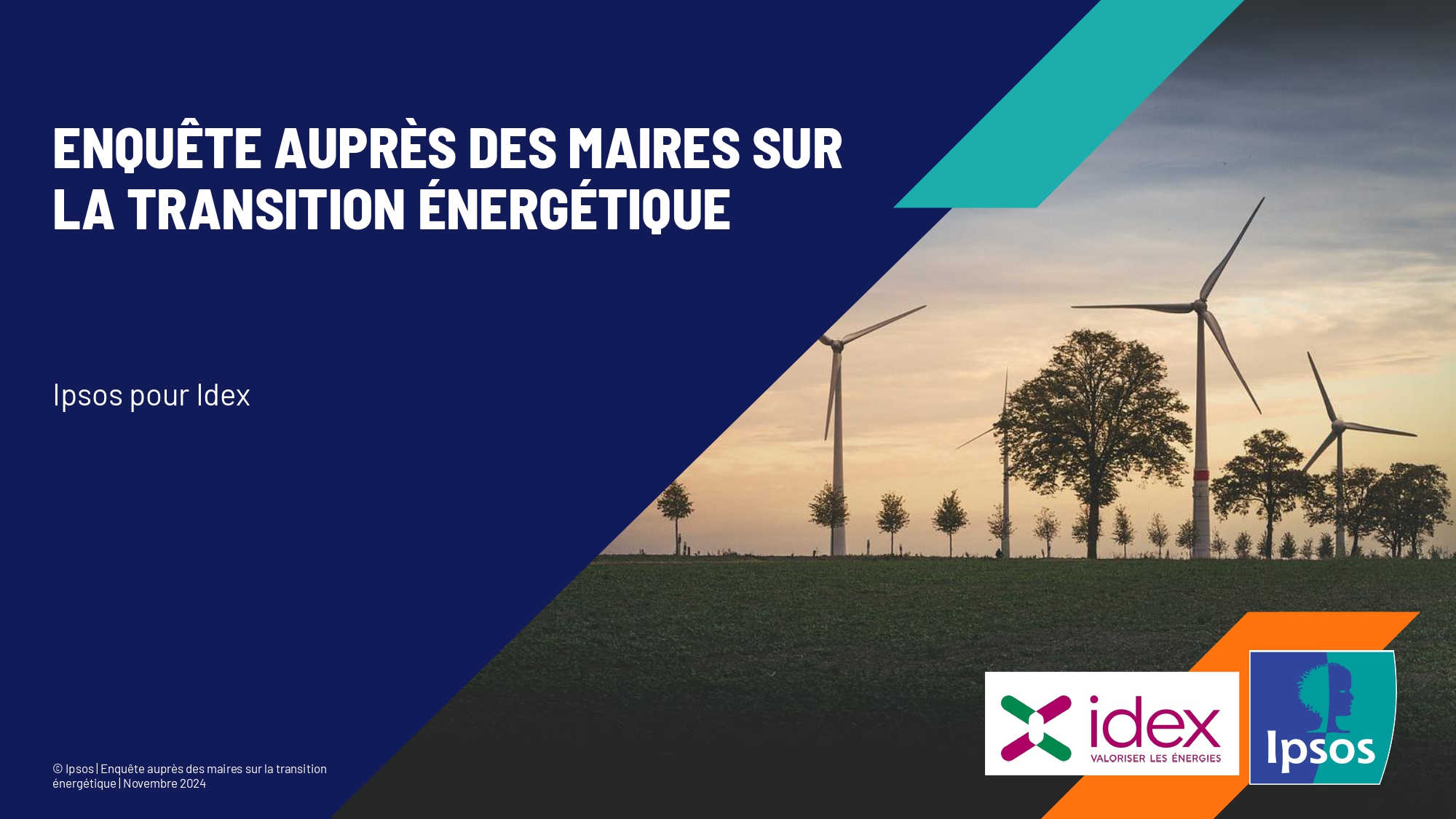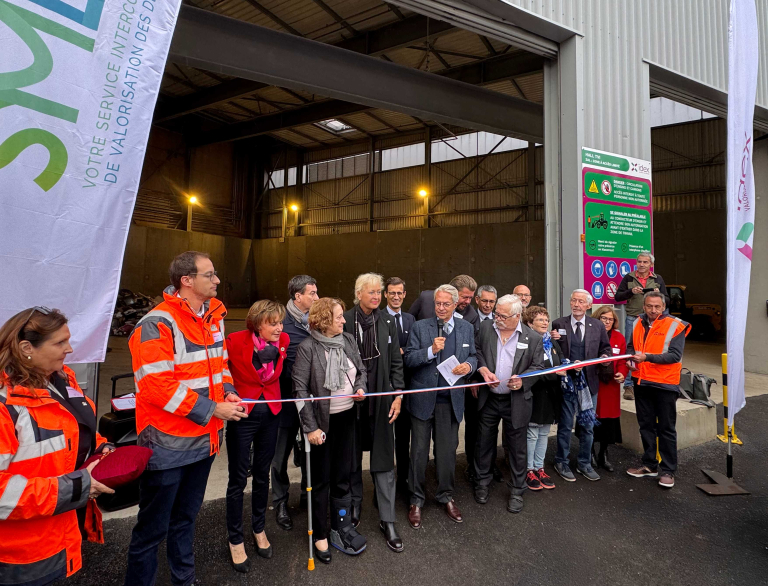- Local authorities
2025 Observatory for the Local Energy Transition: what people in France really think
Idex has published its 2025 Observatory survey findings, in partnership with Ipsos and Villes de France, featuring a new chapter on people's perceptions of the challenges surrounding the energy transition in their towns and cities. This France-wide survey, carried out with a representative sample of the population, sheds new light on town and city dwellers' expectations ahead of the 2026 municipal elections.

Our towns and cities are playing the key role in the energy transition. The people living in them want local, affordable, sustainable solutions. This transition is an opportunity to keep our energy costs under control and create non-relocatable jobs. This will be one of the central issues in the upcoming 2026 municipal elections because it has a direct influence on households' purchasing power as well as an area's appeal.
The energy transition is rising up the agenda for 2026
The Observatory has confirmed that the energy transition is one of the decisive issues on voters' minds just months ahead of the next municipal elections: 87% of citizens see it as an important issue and 32% rank it as a priority.
The campaign proposals that attract the most voter support include local grants for home energy renovation (a priority for 44% of respondents), waste recovery and other circular economy initiatives (37%), and programmes to power public buildings with solar energy (36%).
Economic concerns and environmental awareness
The survey shows that the price of energy remains the top concern for people in France (73% of respondents), ahead of the consequences of climate change (52%) and the country's energy dependence (38%). This points to the need for a balanced approach to the energy transition combining economic upsides with environmental benefits.
It also finds that 65% of people in France prefer cleaner, local energy even if it costs more – but within limits: most are willing to pay up to 5% to 15% more.
Mixed perceptions of municipal action
The Observatory's survey also highlights a lack of information and visibility around municipal measures to advance the energy transition. While 42% of respondents say their town or city is taking action, 34% say it is not and 24% lack the information to form an opinion.
Even more tellingly, a significant share of town and city dwellers (26% to 36% depending on the type of action) do not know whether their municipality is taking concrete measures or not, pointing to a clear need for education and communication.


The energy transition relies on strong partnerships between local authorities, citizens and businesses. Our Observatory survey confirms that people in France are showing increasing interest in local energy sources and want to play a part in this transformation. We are certain that the local level is the most effective one to drive the energy transition, which is vital for the environment as well as economic sovereignty.
The main trends shaping local energy transitions
The measures that citizens support
The measures that people in France rank high among their priorities include:
- Energy recovery from waste
- Renovation of public buildings
- Public grants for home energy renovation
- Expansion of solar photovoltaic capacity
- Expansion of heating networks powered by renewable energy
The untapped potential in heating networks
The study reveals keen interest in heating networks powered by renewable energy with 68% of respondents willing to connect one. For three main reasons: lower energy bills (60%), long-term price stability (38%) and the benefits for the environment and climate (31%).
Notably, 16% did not know what heating networks are, pointing to a clear need to spread awareness of this option, which has huge growth potential (only 4% of homes are currently connected to one).
Growing interest in civic engagement
The study also reveals a strong desire to become more involved in local decisions regarding energy: 60% of all respondents and 70% of respondents under age 35 want to play a more active role in their town or city's choices in this regard.
More specifically, 44% expressed interest in investing in local renewable energy projects, opening the door to new participatory financing models to fast-track the energy transition at local level.
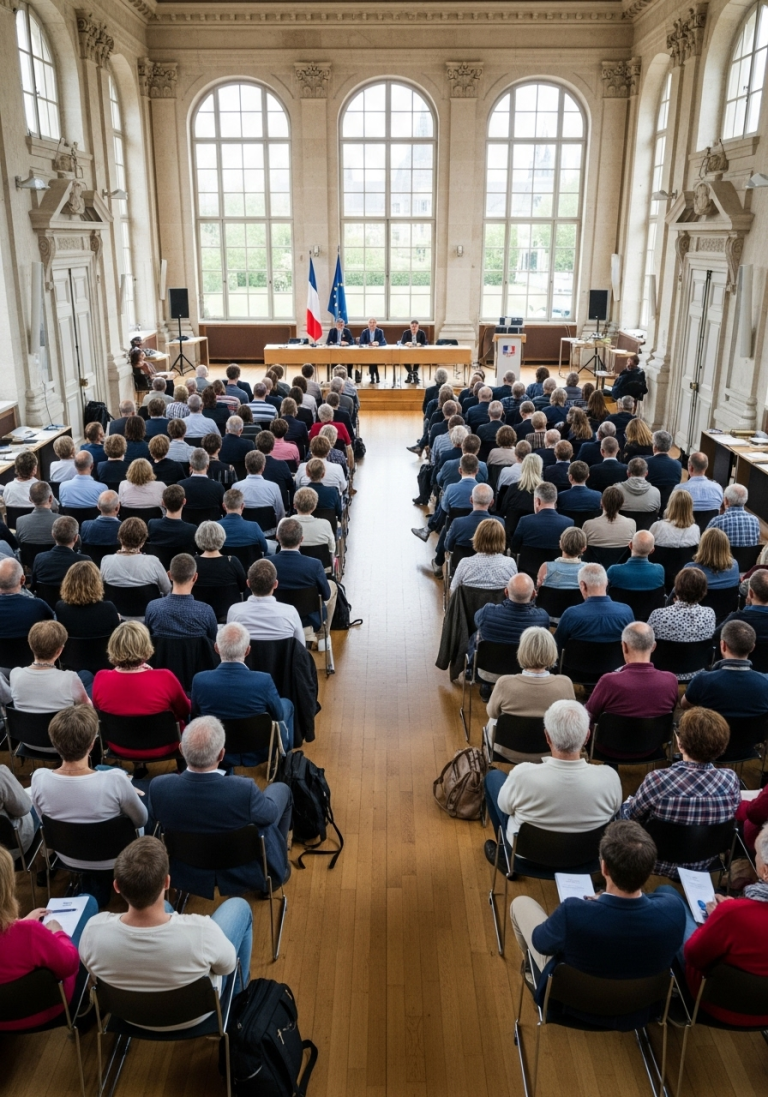

This Observatory is making a vital contribution to public debate by giving citizens a voice on local energy-related issues. While we work on global climate trajectories, it is also essential to understand how the energy transition is perceived and experienced by the people that it affects the most. Our ability to accomplish this system-wide transformation of our energy model depends, to a large extent, on what happens at local level.
A scientific council to guarantee scientific integrity
To run its second survey, the Observatory for the Local Energy Transition set up a multidisciplinary scientific council chaired by François Gemenne, a respected political scientist and researcher and a co-author of the IPCC's Sixth Assessment Report. The leading experts and practitioners on the council contribute their insights and help ensure the survey and its findings are sound as well as relevant.
The scientific council's role is to guide research, review and approve its methodology, and issue recommendations to ensure the study's findings closely address policymakers' needs in relation to the energy transition.
Scientific council members
- François Gemenne (Chairman), a political scientist and researcher specialised in international climate governance and migrations, and a co-author of the IPCC's Sixth Assessment Report
- Frédérique Macarez, Mayor of Saint-Quentin, President of the Saint-Quentinois urban community and Vice-president of Villes de France
- Christine Lavarde, Senator for Hauts-de-Seine
- Brice Teinturier, Deputy CEO of Ipsos
- Benjamin Fremaux, CEO of Idex [RF1]
This scientific governance structure underpins the Observatory's credibility and ensures its work follows a rigorous, objective approach to enlighten local policymakers as well as support the energy transition.

Valuable insights for local authorities and energy-sector stakeholders
The findings in the general-public section of the 2025 Idex Observatory survey provide several pointers to speed up the energy transition in towns and cities:
- Raise public awareness of local energy solutions, including heating networks (which part of the population is not yet familiar with)
- Highlight the economic advantages of low-carbon solutions (a key factor to secure public support)
- Underline the local dimension of energy projects (which overlaps with growing interest in greater energy sovereignty)
- Broaden participation (to meet people's increasing desire to be involved in their area's energy transition)
- Help municipalities communicate more effectively to spread awareness of their local initiatives
Learn more about the 2025 Observatory for the Local Energy Transition
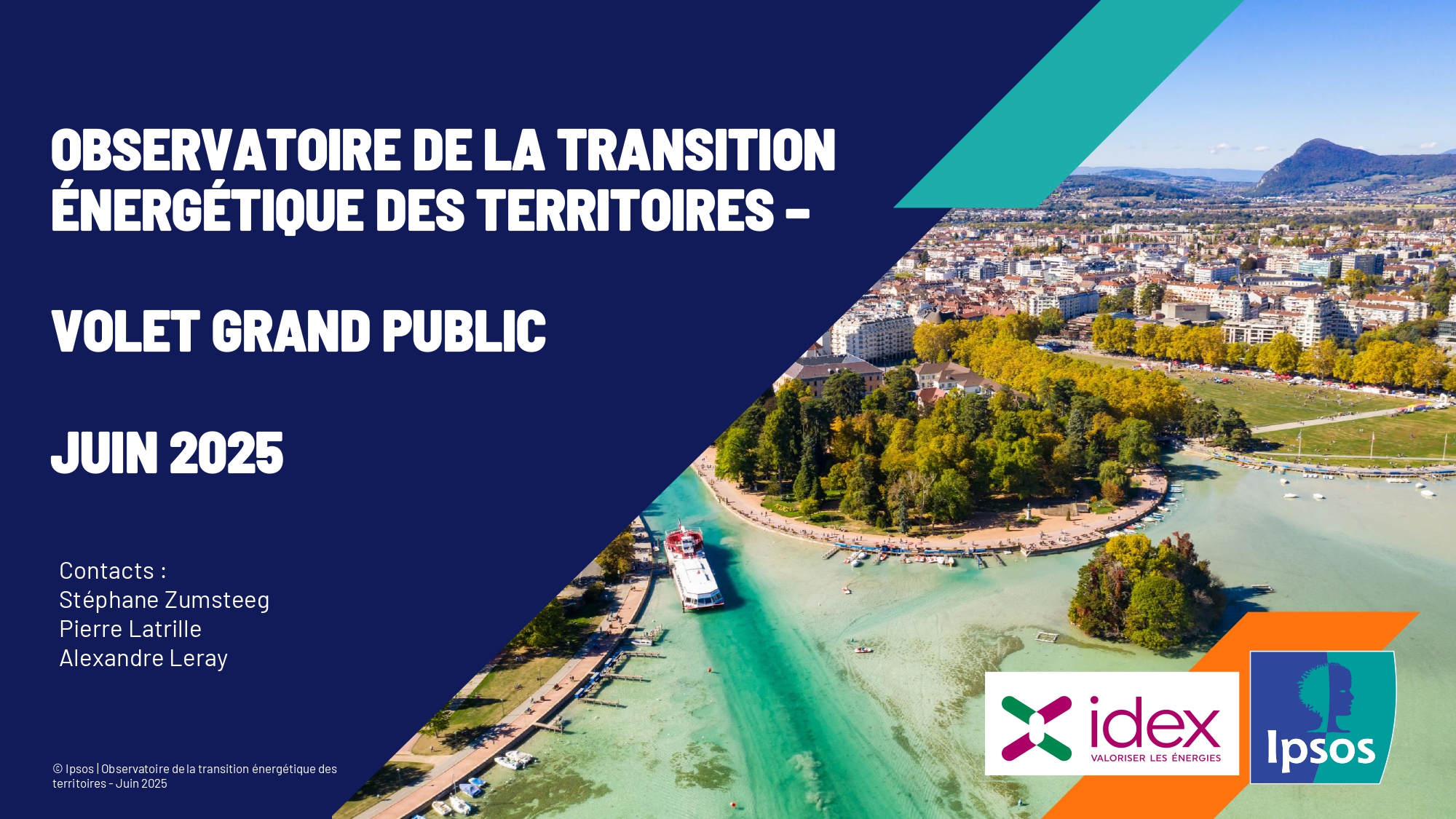
Methodology
This survey was conducted by Ipsos with a representative sample of 2,000 people, interviewed online via Ipsos' Access Panel. The quota-based sampling method was based on gender, age, social and professional category, region and type of urban area.
About the Observatory for the Local Energy Transition
The Observatory for the Local Energy Transition, launched in 2024, analyses energy transition dynamics at town and city level. Its 2025 survey features a new section on local residents' perceptions, offering deeper insight into their expectations and concerns around energy in their area.
About Villes de France
Villes de France is a cross-party association of elected officials that represents and works with towns and cities with populations ranging from 10,000 to 100,000 and their inter-municipal urban communities. These towns and cities are home to nearly half of France's population.

